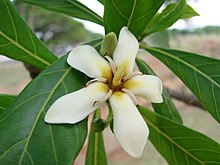| Genipa americana | |
|---|---|

| |
| Flower | |
| Conservation status | |
 Least Concern (IUCN 3.1) | |
| Scientific classification | |
| Kingdom: | Plantae |
| Clade: | Tracheophytes |
| Clade: | Angiosperms |
| Clade: | Eudicots |
| Clade: | Asterids |
| Order: | Gentianales |
| Family: | Rubiaceae |
| Genus: | Genipa |
| Species: | G. americana |
| Binomial name | |
| Genipa americana L. | |
| Synonyms | |
List
| |
Genipa americana (/ˈdʒɛnɪpə/) is a species of trees in the family Rubiaceae. It is native to the tropical forests of North and South America, as well as the Caribbean.
Description
Genipa americana trees are up to 30 m tall and up to 60 cm dbh. Their bark is smooth with little fissures. The leaves are opposite, obovate, or obovate oblong, 10–35 cm long, 6–13 cm wide, and glossy dark green, with entire margin, acute or acuminate apex, and attenuated base. The inflorescences are cymes up to 10 cm long. The flowers are white to yellowish, slightly fragrant, calyx bell-shaped, corolla at 2–4.5 cm long, trumpet-shaped, and five- or six-lobed. The five short stamens are inserted on top of the corolla tube. The fruit is a thick-skinned edible greyish berry 10–12 cm long, 5–9 cm in diameter.
Distribution and habitat
Genipa americana is native to the tropical forests of the Americas, from the Caribbean south to Argentina. It is present from sea level up to 1200 m of elevation, although some argue the original native range as being northern South America.
Vernacular names
In English, the tree is known as the genip tree /ˈdʒɛnɪp/ and the fruit as genipap /ˈdʒɛnɪpæp/.
Colombia: jagua, caruto, huito; Brazil: jenipapo, formerly genipapo; Costa Rica: guaitil, tapaculo; Nicaragua: tapaculo, yigualtí; Mexico: shagua, xagua, maluco; Perú: huito, vito, jagua; Argentina: ñandipá; Puerto Rico: jagua; Bolivia: bí
Its name has been reconstructed as we'e (*weʔe) in Proto-Tucanoan.
Chemical compounds
The following compounds have been isolated from G. americana: genipic acid, genipinic acid, genipin (all three from the fruit) and geniposidic acid (leaves).
Uses
The unripe fruit of G. americana yields a liquid used as a dye for tattoos, skin painting, insect repellent and food.
This species is also cultivated for its edible fruits, which are eaten in preserves or made into drinks, jelly, or ice cream.
The wood is reported to be resistant, strong, and easily worked; it is used in the making of utensils and in construction and carpentry.
Gallery
See also
References
- Rotton, H. (2021). "Genipa americana". IUCN Red List of Threatened Species. 2021: e.T61958206A61958208. doi:10.2305/IUCN.UK.2021-2.RLTS.T61958206A61958208.en. Retrieved 18 December 2022.
- ^ Liogier, Alain H. (1985). Descriptive Flora of Puerto Rico and Adjacent Islands. La Editorial, UPR. p. 97. ISBN 9780847723386.
- ^ Francis, Macbride, J.; E., Dahlgren, B. (1936). "Flora of Peru /". Fieldiana. v.13:pt.6:no.1 : 106.
{{cite journal}}: CS1 maint: multiple names: authors list (link) - ^ López, René; Montero, Martín (2005). "27 - Genipa americana". Manual de identificación de especies forestales con manejo certificable por comunidades (in Spanish). Instituto Amazónico de Investigaciones Científicas "SINCHI". ISBN 9789589759745.
- ^ Food and Fruit-bearing Forest Species: Examples from Latin America. FAO. 1986. pp. 141. ISBN 9789251023723.
- ^ Grandtner, M. M.; Chevrette, Julien (2013). Dictionary of Trees, Volume 2: South America: Nomenclature, Taxonomy and Ecology. Academic Press. p. 263. ISBN 9780123969545.
- ^ Hanelt, Peter; Research, Institute of Plant Genetics and Crop Plant (2001). Mansfeld's Encyclopedia of Agricultural and Horticultural Crops: (Except Ornamentals). Springer Science & Business Media. p. 1775. ISBN 9783540410171.
- Duarte, Odilo; Paull, Robert (2015). Exotic Fruits and Nuts of the New World. CABI. pp. 284–285. ISBN 9781780645056.
- "genip, genipap". Oxford English Dictionary (Online ed.). Oxford University Press. (Subscription or participating institution membership required.)
- ^ Connolly, J.D.; Hill, R.A. (1991). Dictionary of Terpenoids. Vol. 1. CRC Press. pp. 49–50. ISBN 9780412257704.
- Coimbra Sanz, Germán (2014). Diccionario enciclopédico cruceño, 3rd edition. Santa Cruz de la Sierra: Gobierno Autónomo Municipal de Santa Cruz. p. 54.
- Chacon, Thiago (2013). On Proto-Languages and Archaeological Cultures: pre-history and material culture in the Tukanoan Family. In Revista Brasileira de Linguística Antropológica. Vol. 5, No. 1, pp. 217–245.
- Bajaj, Y. P. S. (2012). Medicinal and Aromatic Plants IV. Springer Science & Business Media. p. 164. ISBN 9783642770043.
- Kupferschmidt, Kai (15 June 2023). "Natural Blue". Science. Retrieved 18 June 2024.

